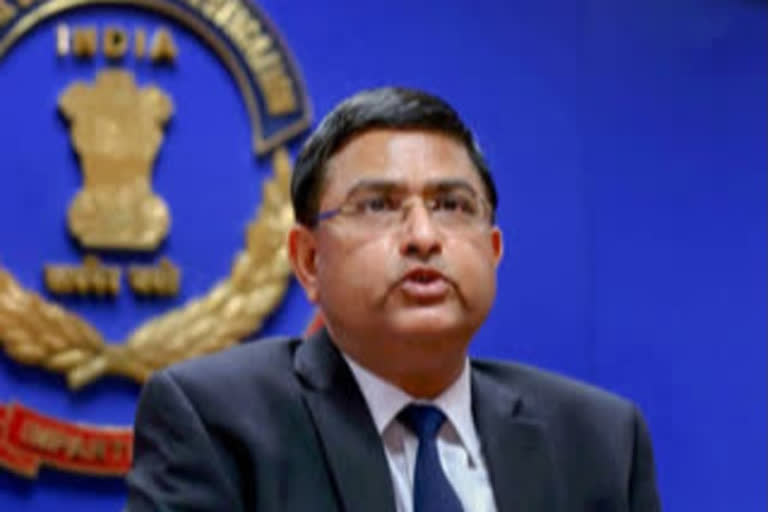New Delhi: The Centre has told the Delhi High Court that the appointment of Gujarat-cadre IPS officer Rakesh Asthana as Delhi Police Commissioner was done in public interest, keeping in mind the diverse law and order challenges faced by the national capital, which have national security implications as well as international/cross border implications.
Defending Asthana's appointment, the Centre, in an affidavit, said that it felt a “compelling need” to “appoint a person as a head of the police force of Delhi, who had diverse and vast experience of heading a large police force in a large State having diverse political as well as public order problem/ experience of working and supervising Central Investigating Agency(s) as well as para-military forces”.
The Centre said his service tenure was also extended in public interest, in exercise of the powers vested in the cadre controlling authority.
“The prime consideration for the same was that Delhi being the capital of the country has been witnessing diverse and extremely challenging situations of public order/law and order situation/policing issues which not only had national security implications but also international/cross border implications,” said the affidavit filed by the Secretary, Union Home Ministry.
It explained that the when a search for a suitable candidate was done in the Union Territory cadre, it was felt that requisite experience was lacking in the present pool of available officers.
In the affidavit filed through lawyer Amit Mahajan, the Centre said no fault can be found in the appointment of Asthana as Delhi Police Commissioner, which has been done in accordance with and after scrupulously following all the applicable rules and regulations.
It submitted that the requirement of having a certain minimum tenure has no application for appointment of Commissioners/Police Heads of Union Territories.
Also Read: Intermeddlers can't be allowed to challenge Asthana's appointment as Delhi CP, Centre tells HC
“The case of AGMUT Cadre in particular and Delhi Commissionerate in particular is a sui generis case so far as the appointment of Commissioner of Police/head of police force is concerned. Any statutory provision or any other regime deserves to be read in such a way that a leeway is given to the Central Government in appointment of Delhi Police Commissioner. Any straightjacket or paediatric approach would not be in national interest,” the affidavit said.
The affidavit was filed in response to a public interest litigation which has sought quashing of the July 27 order issued by the Ministry of Home Affairs appointing Asthana as the Delhi Police Commissioner and also the order granting inter-cadre deputation and extension of service to him just before his superannuation on July 31.
The Centre has contended that the plea by Sadre Alam, a lawyer, is an “abuse of process of law and manifestly an outcome of some personal vendetta” while submitting that a PIL in service matter is not maintainable.
It said that the PIL, as well as the intervention of NGO Centre for Public Interest Litigation (CPIL) – which has challenged Asthana's appointment before the Supreme Court, “deserves to be dismissed with exemplary costs”.
“The petitioner and the intervener are mere busy bodies. Both the petitioner and more particularly the intervener who claims to be espousing a public cause, never considered challenging appointment of eight (8) erstwhile Police Commissioners though they were appointed in the same manner as is done in the case of Respondent No.2 (Asthana).
"Such a selective exhibition of 'public interest' speaks volume about the motive behind filing this petition/intervention application/writ petition in the Supreme Court respectively by the petitioner/intervener only in case of the Respondent No 2,” the affidavit said.
The Centre alleged that the petition before the high court was a “verbatim reproduction” the intervenor's plea before the top court and said that such a conduct “cannot be lightly brushed aside as plagiarism”.
The petition has contended that the appointment of Asthana is in clear and blatant breach of the directions passed by the Supreme Court in Prakash Singh case as the officer does not have a minimum residual tenure of six months and no UPSC panel was formed for his appointment of Delhi Police Commissioner.
It also contended that the High-Powered Committee comprising the Chief Justice of India, Prime Minister and the Leader of Opposition, in its meeting held on May 24, 2021, rejected the Central government''s attempt to appoint Asthana as the CBI Director on the basis of the six-month rule as laid down by the Supreme Court in the Prakash Singh case.
The appointment of Asthana to the post of Commissioner of Police, Delhi must be set aside on the same principle, it said.
The petition with similar prayers which has been filed by CPIL before the Supreme Court has urged to direct the central government to produce the July 27 order it issued, approving the inter-cadre deputation of Asthana from Gujarat cadre to AGMUT cadre.
The petition has also urged the apex court to set aside the Centre''s order to extend Asthana's service period.
On August 25, the Supreme Court had asked the high court to decide within two weeks the plea pending before it against the appointment of the senior IPS officer as Delhi Police Commissioner.
The matter was listed for hearing on Thursday but the concerned bench was not available and now it will be heard on September 20. PTI



